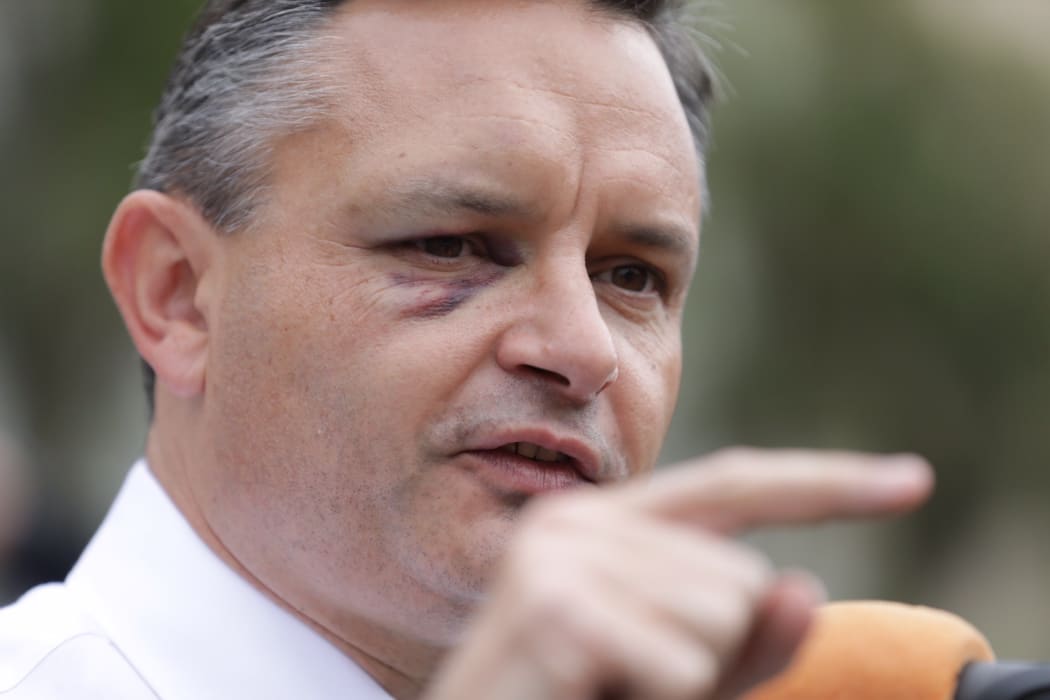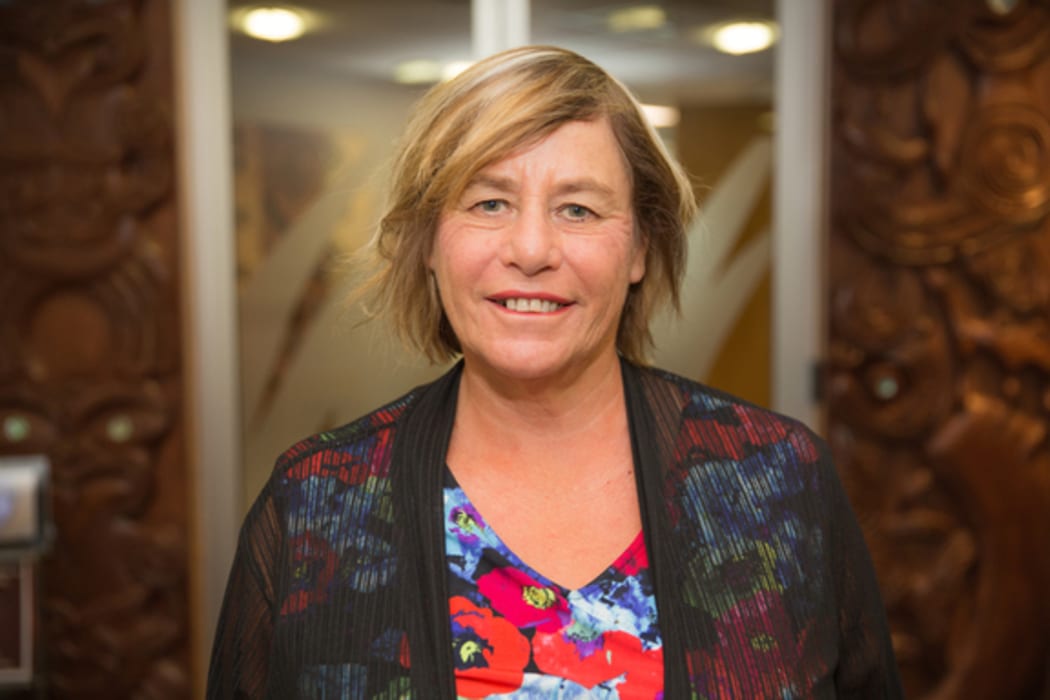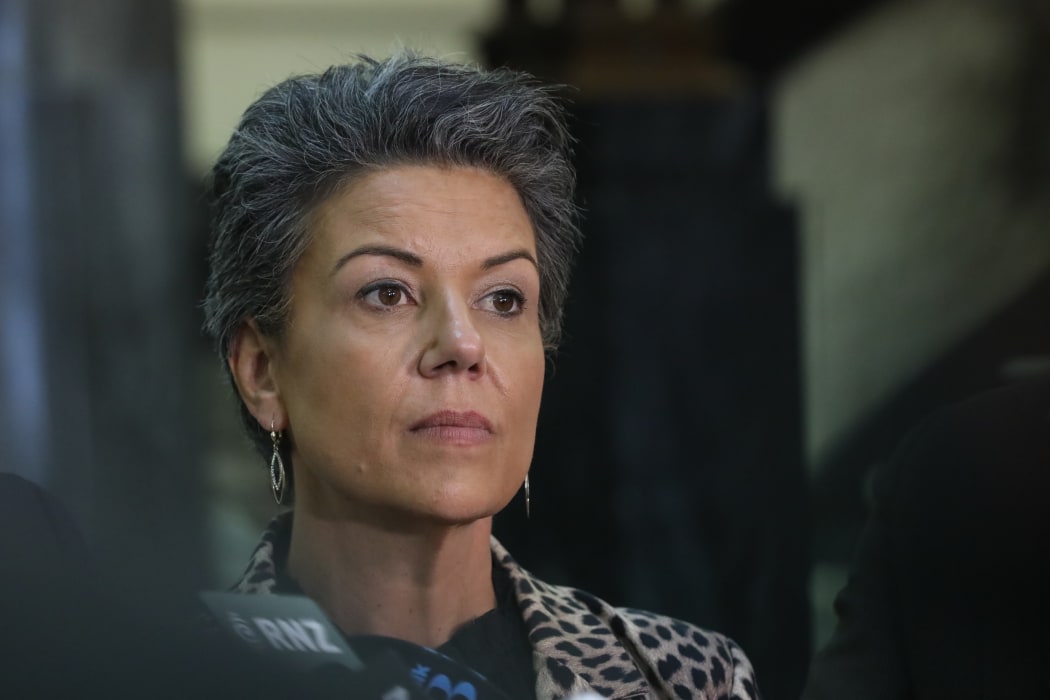Concerns about violence against MPs have risen after an unprovoked attack on Green Party co-leader James Shaw yesterday.

Greens Party co-leader James Shaw appeared with his black eye at the climate change strike in Wellington. Photo: RNZ / Rebekah Parsons-King
Yesterday, Mr Shaw suffered a broken eye socket, bloody nose and lacerations to his face after being grabbed and hit on Glenmore Street near the Botanic Gardens in Wellington.
Mr Shaw posted to Twitter today expressing his gratitude for the messages of support, as well as to a couple who helped him, and emergency services.
He said he was doing okay, and looking forward to the "School Strike 4 Climate".
Thank you all so much for your messages of support. I’m back and I’m ready to head to the #ClimateStrike pic.twitter.com/3IiWwf0x99
— James Shaw (@jamespeshaw) March 14, 2019
Earlier, National Party deputy leader Paula Bennett told Morning Report the attack was "horrible to hear about".
"You can't even fathom that you're going about your normal morning, walking to work, and then having a completely unprovoked attack like that must have been terrifying," Ms Bennett said.
"It's one of those where politicians and the country unite in being shocked and angry that in this peaceful, beautiful country, we've got this happening to anyone."
Ms Bennett and former Green MP Sue Bradford have both said MPs needed more training on how to protect themselves from the threat of violence from members of the public.
However, it was important for MPs to be able to go about their daily lives without security guards watching over them, they said.

Former Green MP Sue Bradford says she suffered death threats over her anti-smacking bill and MPs need more security training. Photo: RNZ / Cole Eastham-Farrelly
Ms Bradford said she faced verbal abuse and death threats over her anti-smacking bill, which was passed in 2007, and was protected by parliamentary security during that time.
She said she was "hyper aware" of her physical safety for a couple of years, but realised how "precious" it was that MPs could generally go about their business without security.
"It's a real characteristic of politics in this country that politicians are more accessible," Ms Bradford said.
"There's less of a barrier between MPs and the citizen than in many countries and that's really healthy for New Zealand politics."
Ms Bennett said she had suffered serious threats of violence three times.
"One time I managed to get in my car and lock it in time and they just kicked the door," Ms Bennett said.

National Party deputy leader Paula Bennett says she managed to lock herself in a car on one occasion, before an angry member of the public kicked the car door. Photo: VNP / Phil Smith
Former prime minister John Key had been keen for her to have diplomatic protection, but she declined the offer.
"That's not New Zealand and it's not the kind of life I want to lead.
"Outside the crazy life we have, I want to lead as normal [of a] life as I possibly can.
"I want to be able to go to the supermarket and walk to work in the morning - I'm going to hold onto that with everything I can."
She sought training on how to keep herself safe from potential threats and said all MPs should be offered that training as part of their induction.
Ms Bradford said the attack on Mr Shaw appeared to have been politically motivated and increased security for MPs needed to be considered.
"It's clear that with our growing population and the intensity of political debate in this time, a greater awareness [of security] by MPs and ministers could be necessary," Ms Bradford said.
Massey University politics professor Richard Shaw, who is no relation to James Shaw, told Morning Report restricting public access to politicians would be an overreaction to the assault yesterday.
At present, only the prime minister has a security detail and that need not change, he said.
Public access to MPs is unusual in New Zealand, compared with other countries, where people are not able to get near to the house of representatives, let alone talk with ministers on the street.
"It's very unusual internationally and it's a very precious thing," Prof Shaw said.
"In an international context, in which there's increasing mistrust in politicians, this becomes even more critical. It's one of the ways in which we keep politics and politicians close to us and vice versa."
A 47-year-old man has been arrested and charged with injuring with intent to injure.
He is due to appear in Wellington District Court today.
The charge carries a maximum penalty of five years in prison.
Mr Shaw has returned to work today.




